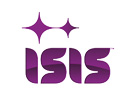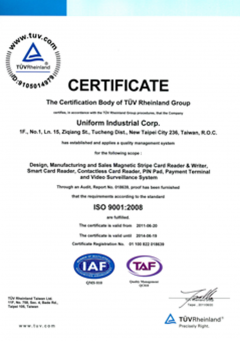Home > About UIC
Certification
UIC Quality Control System provides the documented procedures which consider the responsibilities, international standard, activities and resources to ensure that the company’s products and services meet the customer's requirements. UIC obtained ISO 9001 in 1988 and had it renewed by TUV NORD CERT with ISO 9001:2008 in June 2011. All of UIC products have passed ISO 9001 standard certification.
Enlarge image
Enlarge image
To fulfill the environment policy, UIC obtained ISO 14001:2004 certifications in 2006. ISO 14001 standard contains the core elements for an effective environmental management system. ISO 14001 is based on the two concepts of continual improvement and regulatory compliance applicable to both service and manufacturing sectors. The standard requires organizations to identify all environmental impacts and associated aspects. Furthermore to define environmental objectives and implement actions for improved performance to improve processes in prioritized areas with significant aspects. UIC follows 4 Green spirit (Green design, Green purchase, Green manufacture & Green product), take effort to meet environment standard, achieve customer green product requirement, and pragmatic operate green forever enterprise.
Green design
take effort to meet environment standard, achieve customer green product requirement, and pragmatic operate green forever enterprise.

 UL (Underwriters Laboratories) is a major product safety testing and certification organization located in United States. UIC products bearing the UL Recognized Component Mark are tested and recognized by UL to meet its safety requirements. This certification is only given to the UIC products after batteries of safety tests done by UL on the samples of UIC products and periodical inspections at UIC manufacturing facilities.
UL (Underwriters Laboratories) is a major product safety testing and certification organization located in United States. UIC products bearing the UL Recognized Component Mark are tested and recognized by UL to meet its safety requirements. This certification is only given to the UIC products after batteries of safety tests done by UL on the samples of UIC products and periodical inspections at UIC manufacturing facilities. UIC offers our full product line in compliance with the RoHS 2.0 Directive requirements. RoHS is the initials for the Restriction of Hazardous Substances and bans the use of lead, mercury, cadmium, hexavalent chromium, polybrominated biphenyls (PBBs) and polybrominated diphenyl ethers (PBDEs) in July.1, 2006. This directive bans the placing on the EU market of furniture, information and communication, and consumer electronics products in electrical and electronic equipment. EU had amended the RoHS directive from RoHS 1.0 (2002/95/EC) to RoHS 2.0 (Directive 2011/65/EU), and the new RoHS 2.0 adds four chemical compositions, expands its banning industries, and uses CE label. The effective date of RoHS 2.0 was Jan. 1, 2013, at which time RoHS 1.0 was abolished.
UIC offers our full product line in compliance with the RoHS 2.0 Directive requirements. RoHS is the initials for the Restriction of Hazardous Substances and bans the use of lead, mercury, cadmium, hexavalent chromium, polybrominated biphenyls (PBBs) and polybrominated diphenyl ethers (PBDEs) in July.1, 2006. This directive bans the placing on the EU market of furniture, information and communication, and consumer electronics products in electrical and electronic equipment. EU had amended the RoHS directive from RoHS 1.0 (2002/95/EC) to RoHS 2.0 (Directive 2011/65/EU), and the new RoHS 2.0 adds four chemical compositions, expands its banning industries, and uses CE label. The effective date of RoHS 2.0 was Jan. 1, 2013, at which time RoHS 1.0 was abolished. Visa pay Wave is a new feature for Visa chip cards, and is using Near Field Communication (NFC) technology, which works with our contactless terminal. The card is perfect for the traditional payment and retail industry, which use to be dominated by cash transactions, but now is moving more towards electronic payments. Examples of these are convenience stores, gas stations, public transportation, fast food restaurants and movie theaters, all in service industries where transaction speed and convenience is very important.
Visa pay Wave is a new feature for Visa chip cards, and is using Near Field Communication (NFC) technology, which works with our contactless terminal. The card is perfect for the traditional payment and retail industry, which use to be dominated by cash transactions, but now is moving more towards electronic payments. Examples of these are convenience stores, gas stations, public transportation, fast food restaurants and movie theaters, all in service industries where transaction speed and convenience is very important.The Visa payWave also supports other forms of payment equipment, such as mobile phones, key chains (for wireless security control), and other personal electronic devices. Visa contactless payment function works with a built-in chip and a copper wire that works as an antenna, which will react when it comes near any card reader connected to a POS terminal. It is a payment done through radio frequency, similar to the EasyCard payment method: Simply put the Visa payWave card near the POS terminal’s reader and it will be detected. Wireless communication can be established between the card and the card reader, and the exchange of transaction information can be completed within approximately 400ms, convenient, fast and safe.
Visa payWave adapt to the global EMV smart card a regulation which is used by Global banks. It is using the ISO 14443 Radio Frequency specifications, and supports NFC mobile phone or PDA and other personal electronic devices. Visa contactless payment terminal or card reader is also ready to use in mobile phones to make contactless payments.
 2014/08/28MasterCard’s PayPass credit card is a new contactless credit card that does not need any physical contact to complete the credit card transaction.
2014/08/28MasterCard’s PayPass credit card is a new contactless credit card that does not need any physical contact to complete the credit card transaction.Thus the credit card machine can complete the credit authorization and the transactions in an easier way. The PayPass system allows you to pay without any need to handing over your credit card to the clerk or putting it into any device, hence, this can effectively reduce the risk of fraud.
The Paypass system allows you to make a transaction without any need for a traditional ATM or similar payment machine. The payment is simple, fast, and safe. Within a range of 4 cm from the MasterCard PayPass sensors, while holding the MasterCard PayPass card in your hand, the MasterCard PayPass reader is sensitive enough to read the card information in a safe and secure way.
MasterCard is using the world's most advanced EMV chip security control and radio technology. When using it the chip gets encrypted, using Dynamic data authentication (DDA) which provides protection against modification of data and cloning. The MasterCard PayPass smart chip generates an independent signature, to improve the security of data during transmission, to prevent the possibility of data theft and skimming.
MasterCard PayPass card controls the need based on the risk, decided to fit the MasterCard PayPass transaction processing procedures for the general online transaction or fast offline transactions. Offline transactions are done within 4 seconds to complete the signing of all procedures.
The MasterCard PayPass card has a "cumulative risk limit" functionality, for smaller transaction amounts (as a substitute for cash), the purchase will be carried out without any problem, for larger amounts, the system will turn the off-line transaction into online transaction, by confirming the process with the card-issuing bank, and it will then require either a pin or a signature to confirm the identity of the cardholder. In this way the cardholder will be protected from losing larger amounts of money. The card is always controlled by the consumers, everything to minimize the risk of fraud problems.
 In 2005, American Express introduced ExpressPay, similar to MasterCard PayPass and Visa payWave. It is a contactless payment system based on wireless RFID, where transactions are completed by holding the credit card near a receiver at which point the debt is immediately added to the account. The card is not swiped and no PIN is entered. Many U.S. merchant and restaurant partners now offer ExpressPay, including Meijer, CVS/Pharmacy, Best Buy, Chevron Corporation, Noah's Bagels, and some McDonald's locations. Office Depot has implemented ExpressPay in all 1200 of its stores.
In 2005, American Express introduced ExpressPay, similar to MasterCard PayPass and Visa payWave. It is a contactless payment system based on wireless RFID, where transactions are completed by holding the credit card near a receiver at which point the debt is immediately added to the account. The card is not swiped and no PIN is entered. Many U.S. merchant and restaurant partners now offer ExpressPay, including Meijer, CVS/Pharmacy, Best Buy, Chevron Corporation, Noah's Bagels, and some McDonald's locations. Office Depot has implemented ExpressPay in all 1200 of its stores. Discover comprehensive and secure payments network supports a full range of credit, debit and prepaid cards, including Discover card. It provides customer-centric tools and programs designed to help issuers, acquirers and merchants drive loyalty, increase transaction volume, and run their businesses with streamlined efficiency. It has also formed strategic alliances with China UnionPay and JCB to provide reciprocal card acceptance on these networks in many countries around the world.
Discover comprehensive and secure payments network supports a full range of credit, debit and prepaid cards, including Discover card. It provides customer-centric tools and programs designed to help issuers, acquirers and merchants drive loyalty, increase transaction volume, and run their businesses with streamlined efficiency. It has also formed strategic alliances with China UnionPay and JCB to provide reciprocal card acceptance on these networks in many countries around the world. Google Wallet is a virtual wallet that securely stores your credit and debit cards, offers, and rewards cards. You can tap your phone to pay in-store using Google Wallet anywhere contactless payments are accepted. You can pay online by signing into your Google Wallet account.
Google Wallet is a virtual wallet that securely stores your credit and debit cards, offers, and rewards cards. You can tap your phone to pay in-store using Google Wallet anywhere contactless payments are accepted. You can pay online by signing into your Google Wallet account. The Isis Mobile WalletTM and its underlying Isis Mobile Commerce PlatformTM enable merchants to develop richer, more personalized and more direct relationships with their customers. The Isis Mobile Wallet stores payment and loyalty cards, offers, even transit passes, and will fundamentally change how consumers shop, pay and save. The Isis Mobile Commerce Platform provides an open, integrated, and robust toolkit that allows merchants to easily mobilize their existing marketing programs and more effectively build loyalty and consideration with their customers. IsisTM is convening the nation’s leading banks, card networks, merchants and mobile carriers to transform the shopping experience.
The Isis Mobile WalletTM and its underlying Isis Mobile Commerce PlatformTM enable merchants to develop richer, more personalized and more direct relationships with their customers. The Isis Mobile Wallet stores payment and loyalty cards, offers, even transit passes, and will fundamentally change how consumers shop, pay and save. The Isis Mobile Commerce Platform provides an open, integrated, and robust toolkit that allows merchants to easily mobilize their existing marketing programs and more effectively build loyalty and consideration with their customers. IsisTM is convening the nation’s leading banks, card networks, merchants and mobile carriers to transform the shopping experience. EMVCo, owned by American Express, JCB, MasterCard and Visa, manages, maintains and enhances the EMV Integrated Circuit Card Specifications, to ensure global interoperability of chip-based payment cards with acceptance devices including point of sale terminals and ATMs.
EMVCo, owned by American Express, JCB, MasterCard and Visa, manages, maintains and enhances the EMV Integrated Circuit Card Specifications, to ensure global interoperability of chip-based payment cards with acceptance devices including point of sale terminals and ATMs.EMVCo also administers a testing and approval process, and oversees the procedures for confirming compliance with the EMV standards. These activities include compliance testing for both chip-based payment accepting devices and payment cards for both the Common Core Definitions (CCD) and Common Payment Application (CPA) specifications. The testing process and procedures help ensure cross-payment system interoperability, which is the over-arching goal of the EMV specifications and EMVCo.
American Express, JCB, MasterCard, and Visa, which each own a fourth of EMVCo, have representatives in the EMVCo organization at both management and working group levels. The four organizations make every decision on a consensus basis to assure card-infrastructure uniformity.
 The PCI Security Standards Council is an open global forum, launched in 2006, which is responsible for the development, management, education, and awareness of the PCI Security Standards, including the Data Security Standard (PCI DSS), Payment Application Data Security Standard (PA-DSS), and PIN Transaction Security (PTS) requirements.
The PCI Security Standards Council is an open global forum, launched in 2006, which is responsible for the development, management, education, and awareness of the PCI Security Standards, including the Data Security Standard (PCI DSS), Payment Application Data Security Standard (PA-DSS), and PIN Transaction Security (PTS) requirements.The Council's five founding global payment brands -- American Express, Discover Financial Services, JCB International, MasterCard Worldwide, and Visa Inc. -- have agreed to incorporate the PCI DSS as the technical requirements of each of their data security compliance programs. Each founding member also recognizes the QSAs, PA-QSAs and ASVs certified by the PCI Security Standards Council.
All five payment brands, along with Strategic Members, share equally in the Council's governance, have equal input into the PCI Security Standards Council and share responsibility for carrying out the work of the organization. Other industry stakeholders are encouraged to join the Council as Strategic or Affiliate members and Participating Organizations to review proposed additions or modifications to the standards.
On this website you'll find useful information about the PCI Security Standards Council, the PCI DSS requirements for merchants, vendors and security consulting companies, and the Council's certification and merchant support services, all created to mitigate data breaches and prevent payment cardholder data fraud.
Note that enforcement of compliance with the PCI DSS and determination of any non-compliance penalties are carried out by the individual payment brands and not by the Council. Any questions in those areas should be directed to the payment brands.







